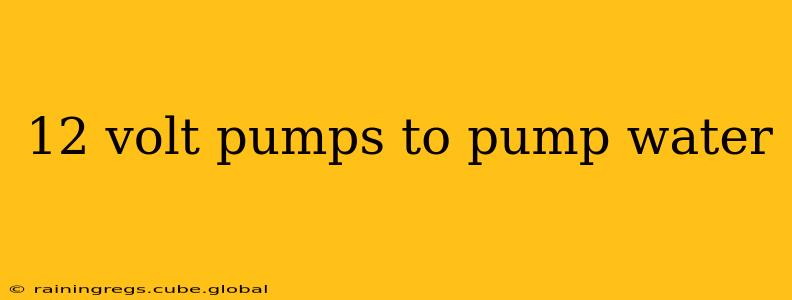Finding the right 12-volt pump for your water needs can feel overwhelming with the sheer variety available. This guide will delve into the specifics, helping you choose the perfect pump for your application. Whether you're looking for a pump for your RV, boat, or a remote water system, we've got you covered.
What are the different types of 12-volt water pumps?
Several types of 12-volt pumps cater to different water transfer needs. Understanding their strengths and weaknesses is crucial for making the right selection.
-
Diaphragm Pumps: These pumps use a flexible diaphragm to move water. They are known for their self-priming capabilities, making them ideal for applications requiring water to be drawn from a source that isn't directly connected to the pump. Diaphragm pumps are often used in portable applications, like RV's and boats. They're also popular for low-pressure, high-volume applications.
-
Centrifugal Pumps: These pumps use a spinning impeller to push water outwards. They are generally more efficient than diaphragm pumps at higher pressures and flow rates. However, they typically aren't self-priming and require a flooded suction. These are better suited for continuous-duty applications where higher pressure is needed.
-
Submersible Pumps: Designed to be submerged in water, these pumps are excellent for drawing water from wells, tanks, or other submerged sources. They come in both centrifugal and diaphragm styles. The key benefit is their ability to operate directly within the water source.
-
Booster Pumps: These pumps increase the water pressure of an existing system. They are often used to improve water pressure in RVs, boats, or homes with low water pressure.
How much flow rate (GPM) do I need?
Determining the necessary gallons per minute (GPM) is paramount. Consider these factors:
- Application: A small garden irrigation system requires significantly less GPM than a whole-house water pump.
- Distance: The farther the water needs to be pumped, the more powerful (and potentially higher GPM) the pump needs to be.
- Head Pressure: The height the water needs to be lifted significantly influences GPM requirements. Higher lifts demand more powerful pumps.
What is the appropriate pressure (PSI)?
Pounds per square inch (PSI) indicates the pump's pressure capability. High PSI is needed for applications requiring water to be pumped to significant heights or distances, or where a forceful spray is needed (e.g., pressure washing). Low PSI might suffice for smaller applications like dispensing water from a tank.
What about self-priming capabilities?
Are all 12-volt water pumps self-priming?
No, not all 12-volt pumps are self-priming. Self-priming pumps can draw water from a source that's not directly connected to the pump. This is a valuable feature for applications where the pump isn't submerged or directly connected to a water source. Diaphragm pumps are often self-priming, while centrifugal pumps usually are not.
How do I choose the right 12-volt pump for my specific needs?
Selecting the correct pump requires careful consideration of your specific requirements. Consider the application, flow rate (GPM), pressure (PSI), and whether self-priming is needed. Consult the pump's specifications to ensure it meets your needs.
What are some common uses for 12-volt water pumps?
12-volt water pumps find applications across various sectors:
- RV and Campervan Systems: Providing water for sinks, showers, and toilets.
- Marine Applications: Supplying water for sinks, showers, and bilge pumps.
- Irrigation Systems: Watering gardens and lawns in remote locations.
- Livestock Watering: Providing water to animals in pastures or fields.
- Emergency Water Supply: Providing backup water in situations where main water supplies are disrupted.
This comprehensive guide should equip you with the knowledge to select the best 12-volt water pump for your needs. Remember to always consult the manufacturer's specifications to ensure compatibility and safe operation.
